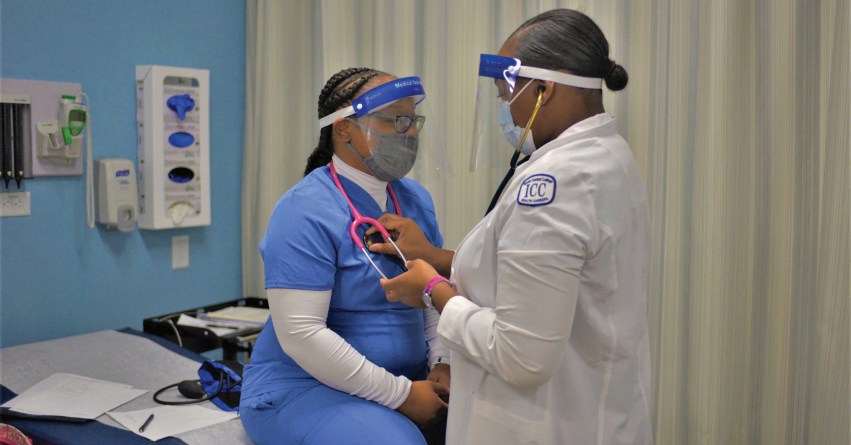
Through the Regional Workforce Alliance (RWA), Illinois Central College has collaborated with businesses, educational districts, economic development agencies, community-based organizations, religious organizations, labor unions and legislators to address issues of poverty, racial injustice and uncredentialed adults. Understanding the importance of creating community to address regional challenges, ICC has provided leadership in developing the RWA, which targets three critical segments of the workforce: the emerging workforce (K-12), the upskilling workforce and the workforce facing multiple barriers. By expanding access to post-secondary credentials paying at least 30 percent above the living wage, the intent is to transform lives, the workforce and the economy.
Through numerous partnerships, ICC has acted as a catalyst against poverty for those who live and work locally, providing pathways to family-sustaining careers. In the past year alone, ICC has partnered through the RWA to lead the implementation of three major workforce initiatives that promote job growth at the local and state levels.
Workforce Equity Initiative
ICC, in partnership with the Illinois Community College Board (ICCB) and Deputy Majority Leader Jehan Gordon-Booth, is the lead college in a statewide $18.7 million Workforce Equity Initiative (WEI) grant. The grant focuses on inclusivity and expanding the workforce by providing credentials and jobs above the living wage for adults residing in disproportionately impacted areas (low-income, low-employment, high-crime). African Americans, due to their underrepresentation in high-demand, high-wage careers, must represent a minimum of 60 percent of participants served by the grant. The end goal is for participating students to secure a full-time job paying at least 30 percent above the regional living wage in these high-demand occupations: CNC operator, welder, CDL truck driver, local area network (LAN) technician, CISCO certified network administrator, CompTIA A+ (computer basics) technician, licensed practical nurse (LPN), emergency medical technician (EMT) and paramedic.
Through the WEI initiative, ICC and 14 other Illinois community colleges are removing employment barriers for underserved and disadvantaged students and propelling them forward to where they want to be. When adults earn credentials with labor market value, it not only changes the trajectory of their lives, but also the lives of their families—while growing the workforce, expanding businesses, and creating a more vibrant regional and state economy.
To date, ICC has had 165 participants in WEI, and 162 certificates or credentials have been earned. Of these students, 77 percent are minority and 68 percent reside within locally identified “high-need” neighborhoods. Even in today’s COVID-challenged market, 46 participants have already been placed into jobs. One unemployed adult, for example, was able to obtain a CDL truck driving license through WEI and obtain employment with System Transport, making over $60,000 a year.

ICC GEER Project
In response to the needs of students affected by the pandemic, ICC announced the launch of the ICC GEER Project in July. This new equity initiative is funded by the Governor’s Emergency Education Relief (GEER) Fund and through efforts championed by the ICCB, State Sen. Dave Koehler, and the Peoria Mayor’s Coalition on Racial Justice and Equity. The $412,000 grant is being used to enroll and retain underrepresented, first-generation and low-income students who may not otherwise enroll or return to college due to the pandemic or digital equity gaps.
The project provides funding for outreach and recruitment, college and career guidance, assessment and testing, tuition assistance and assistance with prior tuition debt, technology needs and support, case management and mentoring, tutoring and technological aids, safe spaces to study, and job placement into careers with family-sustaining wages. It has engaged ten local partners, including community-based and religious organizations, schools, neighborhood associations and employers—another example of how this community comes together to benefit those who need it most.
Through GEER, ICC and its partners are serving 131 college students this semester. More than 90 percent are minority, 76 percent are first-generation, and over 30 percent reside within “high-need” neighborhoods. One grateful student had the opportunity to enroll in this fall’s LAN Tech program thanks to GEER funding, and truly appreciates what the program has done for her. Truly, this project is already changing lives.
GPEAK
Just this September, ICC announced the pilot launch of Greater Peoria Essential Abilities and Knowledge (GPEAK), a partnership with Peoria's CEO Council and Regional Workforce Alliance, Greater Peoria Economic Development Council, Illinois Community College Board, Jobs for the Future and Northern Illinois University Education Systems Center.
GPEAK prepares individuals for fulfilling careers and meaningful employment by certifying essential workforce skills attainment. The certification system was developed regionally by over 70 company and agency participants. The full program, which launches in January, measures an individual's demonstration of essential skills needed for entering the workforce, encourages participants to reflect on their growth and development, and validates and communicates this information in a manner recognized by employers across Greater Peoria. It will serve the region with a free and open platform available to students, education systems, community-based agencies and employers alike.
Aligned with the state’s PACE Essential Employability Competencies and regionally defined Key Performance Indicators, the GPEAK system provides students time with mentors, workshop activities, individually guided resources, case studies, self-inventories and a range of activities and videos.
With our amazing community partners, Illinois Central College remains committed to changing lives both locally and statewide through workforce development. For more information about these programs, visit icc.edu/wei, icc.edu/geer and data.greaterpeoria.us/gpeak. PM
- Log in to post comments

